2019 MENTAL HEALTH DAY PRESS STATEMENT
- Version
- Download 59
- File Size 179.47 KB
- File Count 1
- Create Date October 10, 2019
- Last Updated October 10, 2019
2019 MENTAL HEALTH DAY
PRESS RELEASE
FOR IMMEDIATE RELEASE
Recognising Legal Capacity - key to Suicide Prevention
10th October, 2019
LUSAKA -Disability rights advocacy organisations, The Mental Health Users of Zambia (MHUNZA) and Disability Rights Watch (DRW) join global observance of Mental Health Day under the theme suicide prevention.
Zambia has continued to lose lives to suicide; depriving the country of critical human resource, families of breadwinners and leaving a trail of trauma and pain that many loved ones hardly recover from for a lifetime.
It is estimated that one person commits suicide every 40 seconds around the world making suicide the second leading cause of death among 15-29 year-olds. Each individual suicide is a tragic loss that affects individuals, families, and communities. The loss of a loved one to suicide can be devastating; often leaving many people wondering what might have been done for someone in such despair who saw suicide as the only way out.
In many countries around the world, it remains highly stigmatized to speak of suicide, whether this involves discussing suicidal thoughts, attempts, or the loss of a loved one to suicide. This makes it difficult to accurately account for the number of suicides in each country or region.
According to the latest statistics from the WHO, approximately 80% of all reported suicides occur in low and middle-income countries, where deaths due to self-poisoning with pesticides account for a large percentage of suicides. However, the average rate as percentage of the population is higher in high-income countries, where guns are more often used in attempts.
We call upon all Zambians to unite in fighting the rising cases of suicide in our communities as the right to life is sacred.
We call upon the government to recognise suicide as a major public health concern and invest in community support services aimed at addressing the stigma associated with suicide and to let those who are struggling with various stress factors and contemplating suicide know that there is help.
DRW and MHUNZA commend the government of the republic of Zambia for enacting the Mental Health Act, 2019, which seeks to promote mental health from a human rights framework and improve community awareness and action to prevent mental illnesses and disabilities.
The organisations are however deeply disturbed that whilst the Act provides that all persons shall enjoy legal capacity, Section 4 allows for restriction of legal capacity on the basis of “mental illness”, “mental disorder” or “mental disability”. The provisions wrongly conflate the concepts of “mental capacity” and “legal capacity”, where the first relates to legal agency and personality and the second is used to refer to cognitive and neurological processes.
Legal capacity is the right to make legally valid decisions and to form legally recognized relationships. It means persons with mental disabilities are the holders of legal rights and duties. The Mental Health Act in Section 4 strips persons with psychosocial disabilities of the right to enjoy their legal capacity on the basis of their actual or perceived mental abilities. We demand that the Act be amended to address this issue and to also remove the classification of persons with mental illness as legally disqualified persons.
The implication of this Act is that it affects all aspects of a person’s life. In the context of the Mental Health Act, it is specifically applied to deny people the right to have a say in their healthcare. It enables forcible and non-consensual detention in psychiatric facilities and treatment against a person’s will.
We note with concern that the provision is repeatedly referenced in new Bills and laws to deny persons with psychosocial disabilities a range of other rights.
The Convention on the Rights of Persons with Disabilities (CRPD) Committee has authoritatively and consistently stated that restriction or removal of legal capacity on the basis of disability can never be justified and violates the right to equality before the law under CRPD Article 12.
We call upon the Zambian government to quickly establish the Mental Health Council as provided for in the Mental Health Act and commence the process of amending the said to address the concerns we have raised above in meaningful consultation with persons with disabilities.
We further recommend that States adopt strategies for preventing suicide through a rights-based approach that avoids excessive medicalization and instead follows modern public health principles which focus on addressing societal determinants, promoting autonomy and resilience through social connection, tolerance, justice, and healthy relationships. Follow here to download
